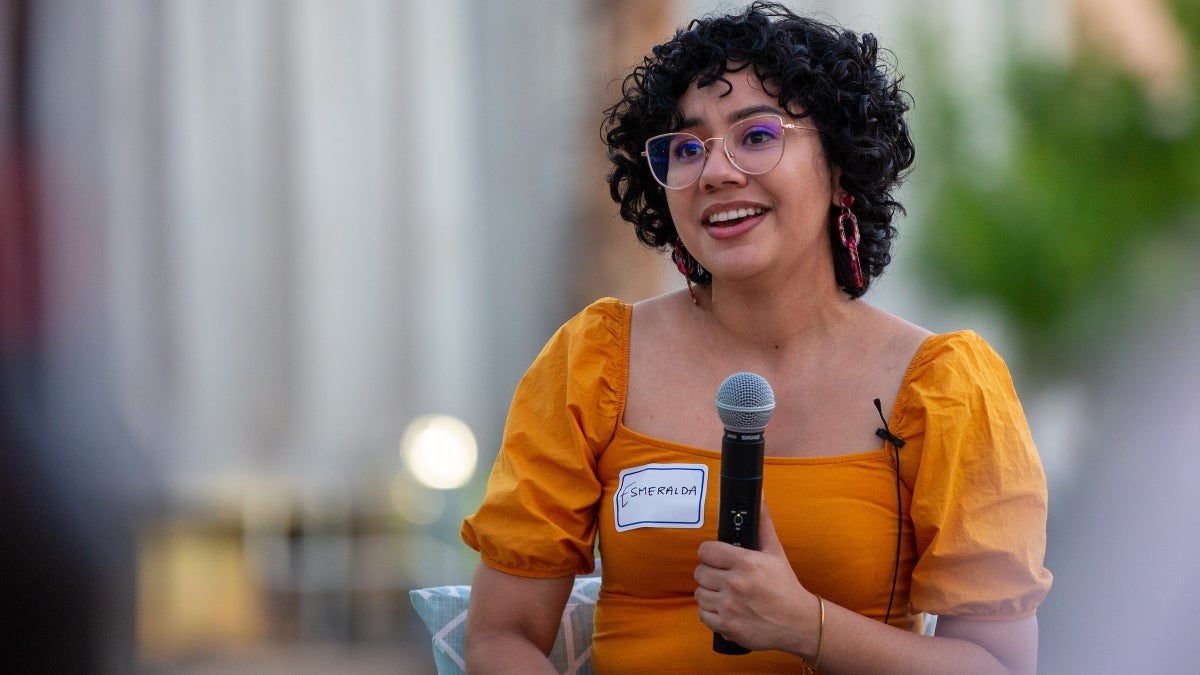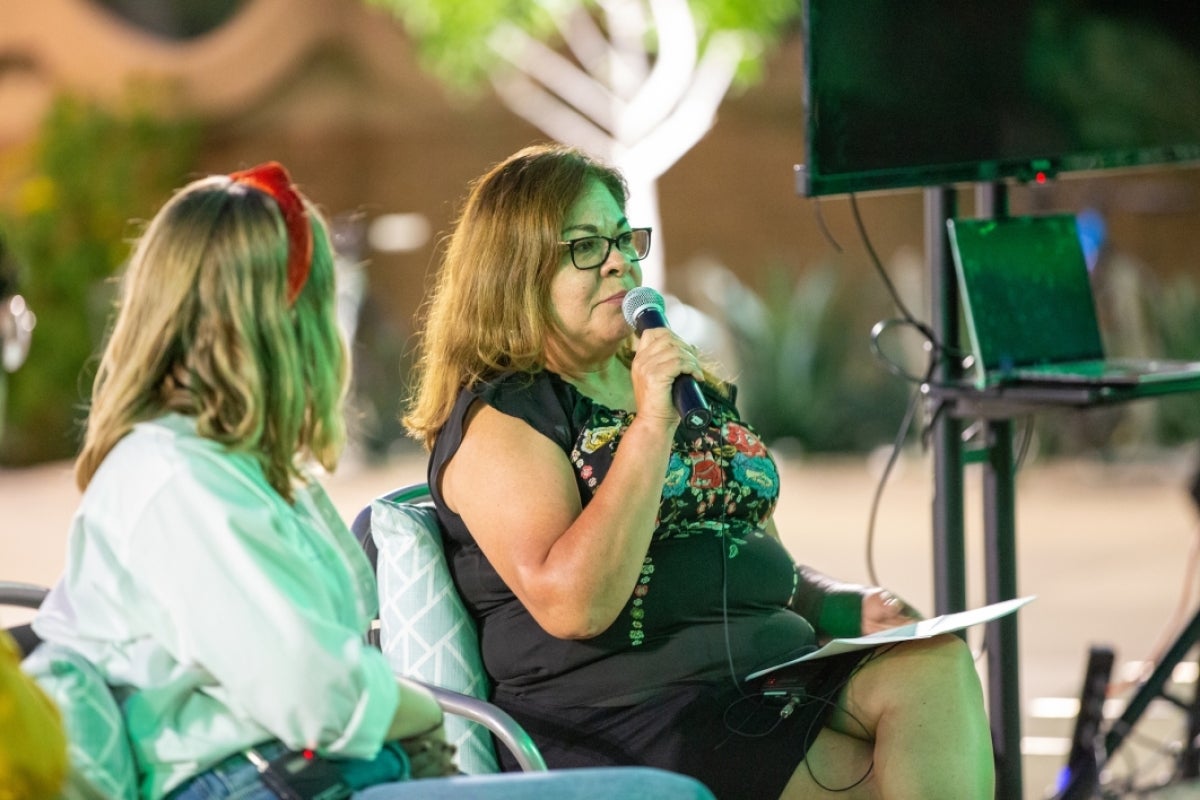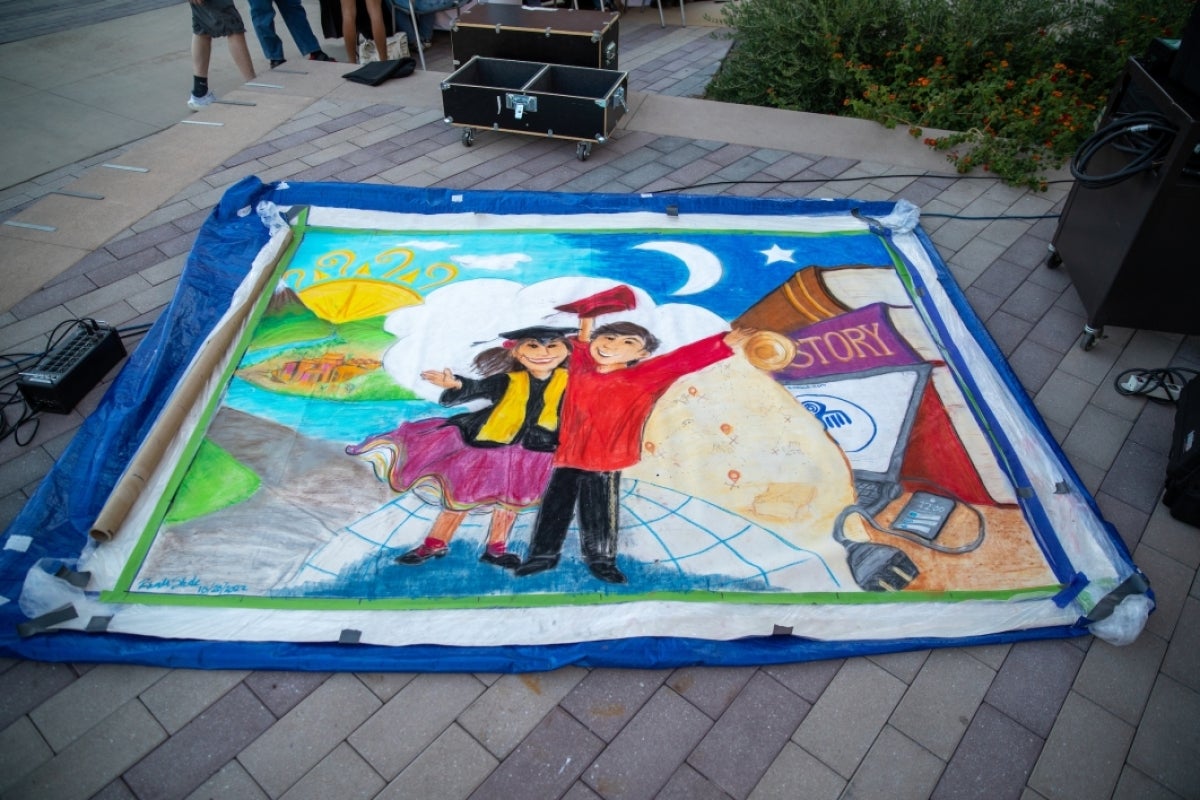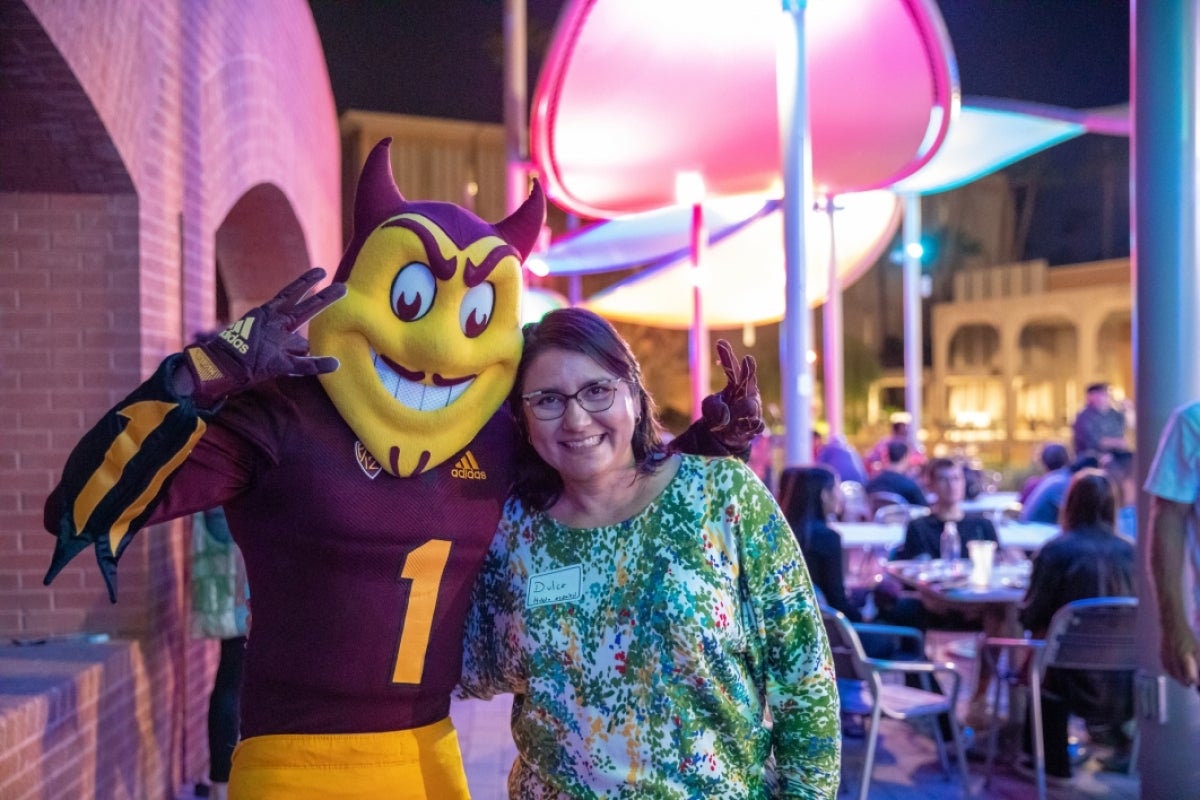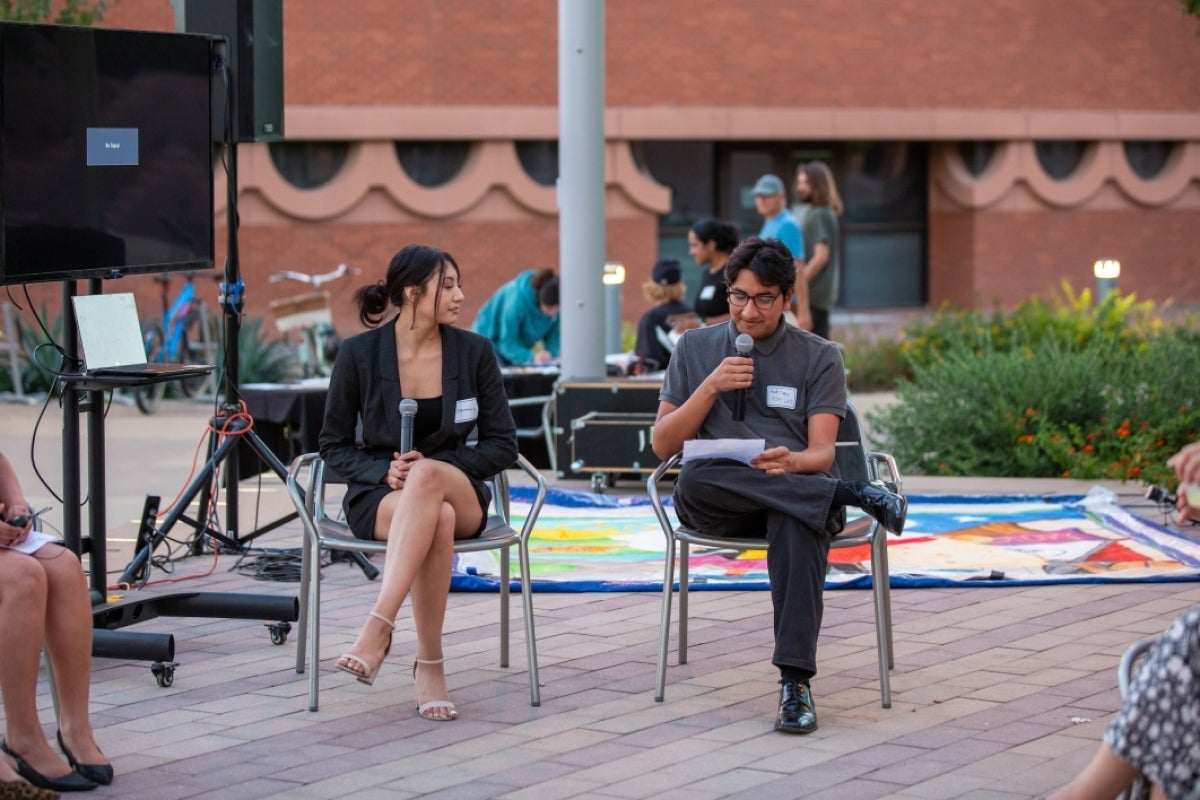A group of high school students got a fun taste of Arizona State University on Thursday, when they were treated to dinner, live music, a visit by Sparky and some advice on a path to higher education.
ASU students in a Humanities Lab course titled “Avanzando: Education Pathways” are spending the semester working with teens at Maryvale High School, talking to the high schoolers about going to college in ways that are culturally and socially responsive to their needs.
“Avanzando” means “moving forward.”
“They have been visiting them at the high school, getting to know them,” said Dulce Gonzáles-Estévez, a principal lecturer in the School of International Letters and Cultures who is co-teaching the course with Mara Lopez, a senior project manager for research in the Center for Broadening Participation in STEM.
The undergraduates asked the Maryvale students what they wanted to know about college, how they got their information and what they wanted the event to be like. Then they planned the logistics, chose the panelists, determined the questions and marketed the event, called “Avanzando Las Humanidades: Education Stories." Eleven Maryvale High School students were bused to the Tempe campus for the evening.
Some of the Humanities Lab students mentored the teens on what it’s like to be in college. Another team talked to them about being an advocate for their community, and another group is putting together a website on how to apply for FAFSA.
“It’s been a huge collaborative effort,” said Gonzáles-Estévez, who said that the students worked with Christina Ngo, ASU's director of social embeddedness, and the Design Studio for Community Solutions, which houses the One Square Mile Initiative in Maryvale, a community in Phoenix.
“Avanzando Las Humanidades: Education Stories” included a panel discussion with three women who talked about their paths and how their background in the humanities paved their way.
Esmeralda Franco Ruiz, who is from Maryvale, is a senior in The College of Liberal Arts and Sciences at ASU.
“When I came to ASU, I was an English major and I was going to be a high school teacher,” she told the crowd.
“Then the pandemic hit and I needed a job, so I worked on a political campaign doing phone banking. Two years later, I was still promoting and working with communities of color, specifically Latina communities who were domestic workers and neglected during the pandemic.
“I went to a predominantly white school and that was the first time I connected with people who looked like me in a long time.”
Franco decided to change her major to transborder studies with a minor in Spanish. She works as a social-embedded analyst in the Office of University Affairs at ASU.
“I love learning about myself and my history and my culture and my community and what makes them dream and hope,” she said.
Pursuing her dream has had some scary moments, Franco said.
“I’m a first-generation student and I’m an only child, and there’s a lot on my shoulders,” she said.
“With a lot of majors, there is a direct line to work, but with the humanities, it’s not always clear. I still get asked a lot, ‘So you’re a transborder studies major. What will you do with that?’ And I’m like, ‘I don’t know.’
“But I enjoy what I learn so much that I forget that I’m afraid and that I don’t know what I’m going to do with my life.”
Megan Vanbuskirk, an ASU alum, is an art teacher at Maryvale High School.
“I did not start college with any idea that I would teach or do art,” she said.
A business major, she studied abroad and found that art helped her to communicate when she didn’t speak the language.
“A friend asked me why I was pursuing business when all I did in my free time was art,” she said. “It’s my nonverbal way to communicate.
“I’ve had a lot of jobs, and this is the best job I’ve ever had because I get to connect with young people and make a difference during what I think is the most interesting time of their lives.”
Francisca Montoya, a longtime community advocate, studied secondary education at ASU and started her career as a high school world history teacher.
“When I was 22 or 23 years old, I never thought I would have this life that I’ve truly enjoyed, and it’s because I have a college degree.
“I came to school as a single parent with a young child back when it was very uncommon. I persevered,” said Montoya, whose two granddaughters are now ASU students. She is now director of community development and special projects for Raza Development Fund, which loans money to nonprofit groups.
Montoya said that studying humanities — culture, language, history and arts — is critical for Latinos.
“It’s really important for individuals in our community to know who we are through our history, Arizona history, the history of this country and the principles that founded this wonderful democracy. It’s not perfect, but it’s one of the best in the world," she said.
“If you know our history, you know where you came from.
“Learning about arts and culture is important because every culture has its own way of expressing itself.”
Montoya was influenced by the social justice movements of the 1960s and '70s – civil rights, women’s liberation and Cesar Chavez’s organization of farmworkers.
“It’s important to get involved in student organizations,” she told the young people.
The event was part of Humanities Week at ASU. The Avanzando Education Pathways course will be offered in spring as SPA 494, and in fall 2023 it will be offered once again as a cross-listed Humanities Lab (HUL 494). Each Humanities Lab is team-taught by one faculty member in the humanities and a second instructor from a professional or scientific field, with the idea that humanities approaches — questions of culture, history, language and ethics — are important in addressing complex social challenges. Students form teams that engage in social action as part of the course.
At the end of the semester, the Avanzando lab students will hold a college fair at Maryvale High School. It will be a homecoming of sorts for Samantha Quitiquit, a first-year student majoring in psychology who graduated from Maryvale last spring.
“I’m a first-generation college student and none of my family knew the enrollment process,” said Quitiquit, one of the student moderators of the panel.
She was part of the Gifted and Talented Academy at Maryvale High School, and had advisors from that program to help her with the process.
“If I hadn’t had them, I don’t know where I’d be today. There’s not that many opportunities in Maryvale, so I’m glad I’m here,” she said.
Top image: Esmeralda Franco Ruiz, who is from the Phoenix neighborhood of Maryvale, is a senior in The College of Liberal Arts and Sciences at ASU. She described why she changed her major to transborder studies and Spanish at the "Avanzando Las Humanidades: Education Stories" event Thursday on the Tempe campus. Photo by Alex Cabrera/ASU Media Relations
More Arts, humanities and education

ASU professor's project helps students learn complex topics
One of Arizona State University’s top professors is using her signature research project to improve how college students learn science, technology, engineering, math and medicine.Micki Chi, who is a…

Award-winning playwright shares her scriptwriting process with ASU students
Actions speak louder than words. That’s why award-winning playwright Y York is workshopping her latest play, "Becoming Awesome," with actors at Arizona State University this week. “I want…

Exceeding great expectations in downtown Mesa
Anyone visiting downtown Mesa over the past couple of years has a lot to rave about: The bevy of restaurants, unique local shops, entertainment venues and inviting spaces that beg for attention from…


